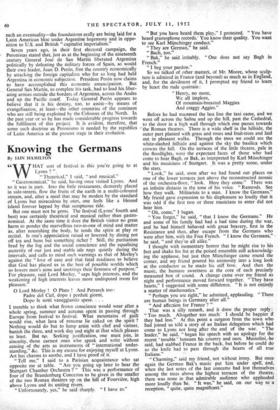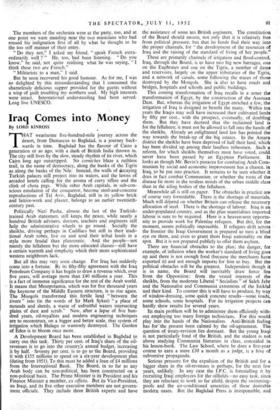Knowing the Germans
HAT sort of festival is this you're going to at Lyons ? "„ " Theatrical," I said, " and musical."
" Gastronomical," he said, having once visited Lyons. And so it was in part. Into the little restaurants, demurely placed in side-streets, flow the fruits of the earth in a multi-coloured stream, and, after a meal that may be modest by the standard of Lyons but miraculous by ours, one feels like a blessed island forever lapped by that sumptuous tide.
But one must not be gross. The festival (Lyons' fourth and best) was certainly theatrical and musical rather than gastro- nomical. At the same time it does the British visitor no great harm to ponder the marvellous two-in-one of mind and matter as, after nourishing the body, he tends the spirit at play or recital. Is one's appreciation raised or lowered by dining not off tea and buns but something richer ? Still, the puritanism bred by the fog and the social conscience and the equalising austerity of our just and stable-isle nags quietly during the intervals; and calls to mind such warnings as that of Morley's against the " love of ease and that fatal readiness to believe that God has placed us in the best of possible worlds which so lowers men's aims and unstrings their firmness of purpose." For pleasure, said Lord Morley, saps high interests, and the weakening of high interests leaves more undisputed room for pleasure."
0 Lord Morley ! 0 Plato ! And Petrarch too : Padre del Ciel, dopo i perduti giorni, Dopo le notti vaneggiando spese. . . .
I tremble to think what frown conscience would wear after a whole spring, summer and autumn spent in passing through Europe from festival to festival. What mountains of guilt would rise, what lava of remorse lie caked on the spirit ? Nothing would do but to lump artist with chef and vintner, banish the three, and work day and night at That which pleases j us least. But no. Seeking justification, one must join, in sincerity, those earnest ones who speak and write without ceasing of the arts as instruments of " international under- standing," &c. This is my excuse for enjoying myself at Lyons. Art has charms to soothe, and I have proof of it.
" Tell me," I said to a Parisian acquaintance who sat opposite me at table. " Are you going up later to hear the Stuttgart Chamber Orchestra ? " This was a performance of four of the Brandenburg Concertos to be given in the smaller of the two Roman theatres up on the hill of Fourviere, high above Lyons and its uniting rivers.
" Unfortunately, yes," he said sharply. " I have to." " But you have heard them play," I protested. " You have heard gramophone records: You know their quality. You want to see Karl Miinchinger conduct."
" They are German." he said.
" Bach, too."
" Bak," he said irritably. " One does not say Bagh in French."
" I beg your pardon."
So we talked of other matter's, of Mr. Moore, whose sculp- ture is admired in France (and beyond) as much as in England, and, for the devilment of it, I prompted my friend to learn by heart the rude quatrain: " Henry, no more, We all implore, Of mountain-breasted Maggies And craggy Aggies."
Before he had mastered the last line the taxi came, and we went off across the Saone and up the hill, past the Cathedral, to the door in a high wall through which one passes towards 'the Roman theatres. There is a wide shelf in the hillside, the outer part planted with grass and roses and fruit-trees and laid out in pleasant walks. Through the trees we could see the white-slashed hillside and against the sky the basilica which crowns the hill. On-the terraces of the little theatre, pale in the floodlights, were the expectant faces of those who had come to hear Bagh, or Bak, as interpreted by Karl Miinchinger and his musicians of Stuttgart. It was a pretty scene, under the • stars.
" Look," he said, soon after we had found out places on one of the lower terraces just above the reconstructed mosaic of the orchestra.,floor, " look. Here they come." There was an infinite distaste in the tone of his voice. " Ramrods. See how they walk. Militarists to a man. I know the Germans." My friend gave expression to his displeasure so loudly that it was odd if the first two or three musicians to enter did not hear him. • " Oh, come," I began.
" You forget," he said, " that I know the Germans." He and some of his family had had a bad time during the war, and he had himself behaved with great bravery, first in the Resistance and then, after escape from the Germans who were after him, with the Free French. " I know the Germans," he said, " and they're all alike."
I thought with momentary horror that he might rise to his feet and shake his fist at the poised ensemble still acknowledg- ing the applause, but just then Munchinger came round the corner, and my friend poured his animosity into a long look at the conductor as he made his stiff bow. And then the music, the humane sweetness at the core of each precisely measured box of sound. A change came over my friend as night and performance moved forward together. " They have hearts," I suggested with some diffidence. " It is not entirely a matter of mathematics."
" Perhaps you are right," he admitted, applauding. " There are human beings in Germany after all."
" And affection for France ? "
That was a silly remark, and it drew the proper reply : " Too much. Altogether too. much: I should be happier if they had less." At this _point a surgeon from the town who had joined us told a story of an Italian delegation which had come to Lyons not long after the end of the war. " The leader," he said, " began his speech with an apology for the recent ' trouble ' between his country and ours. Mussolini,-he said, had stabbed France in the back, but before he could do so the knife had to pass through the hearts of all true Italians."
" Charming," said my friend, not without irony. But once again the German Bak's music put him under spell, and, when the last notes of the last concerto had lost themselves among the trees above the highest terraces of the theatre, there was none in that admirable audience who applauded more loudly than be. " It was," he said, on our way to a reception, quite, quite magnificent." The members of the orchestra were at the party, too, and at one point we were standing near the two musicians who had roused his indignation first of all by what hp thought to be the too stiff manner of their entry.
" Do they not," I asked my friend, " speak French extra- ordinarily well ? " He, too, had been listening. " Do you know," he said, not quite realising what he was saying, " I think these two are French."
" Militarists to a man," I said.
But he soon /recovered his good humour. As for me, I was so delighted by this misunderstanding that I consumed the shamelessly delicious supper provided for the guests without a wisp of guilt troubling-my northern soul. My high interests_ were intact. International understanding had been served. Long live UNESCO.








































 Previous page
Previous page